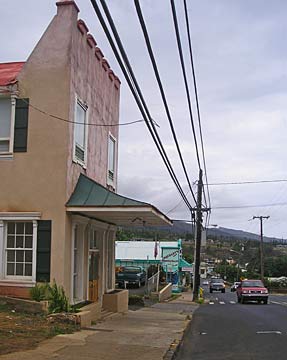
GARY T. KUBOTA / GKUBOTA@STARBULLETIN.COM
Mental Health Kokua plans to redevelop the building in the foreground on Market Street in Wailuku into a 12-bed facility that will help people recovering from mental illness reintegrate back into the community. But some merchants fear it and several other projects will discourage potential shoppers from the area.
|
|
Planned Wailuku developments worry some store owners
WAILUKU » In old Wailuku, where weeds grow through an occasional sidewalk crack, some merchants normally happy with any improvements in their town are worried the latest construction proposals will chase away their customers.
The proposed redevelopments include a storefront food service business and apartment house for reintegrating former prison inmates into the community, and two separate group homes for people recovering from mental illness.
The projects are scheduled to be reviewed by the Maui Redevelopment Agency on Friday.
On the agenda are proposals by the BEST Reintegration Program to renovate a store and apartment building on Vineyard Street to house up to 25 former inmates and operate a food service business and convenience store.
About a block away on Market Street, Mental Health Kokua proposes redeveloping a two-story building for recovering mental health patients.
A couple of blocks east of Market Street, another Mental Health Kokua group home for recovering mental health patients is planned on Central Avenue.
John Noble, co-owner of Noble Gallery and a building owner, said the commercial district of Wailuku is no place to have buildings housing former prison inmates and recovering mental health patients.
"There's going to be a stigma," said Noble, a building owner for 25 years. "We're struggling as it is."
Sheila Hubin, owner of Sheila's Junktique, said she has mixed feelings about the proposed project.
She said she knows these projects are needed to help Maui people but thinks they might make customers think twice about shopping in Wailuku.
She said she plans to support the programs if they're approved in the commercial district.
John Rippy, co-owner of Squeaky's Family Restaurant, said he views the projects as an improvement over what has been in those buildings.
Rippy said the building next to his restaurant has been used in the past as temporary housing for transients and he welcomes its use by Mental Health Kokua services.
"I think it's going to be good for the area," he said. "I don't think we should have a fight with these people."
Jocelyn Perreira, an executive with an association aimed at revitalizing the town, said the projects are consistent with the Wailuku Redevelopment Plan approved by the Maui County Council in October 2001.
Perreira said the nonprofit groups are providing an extension of county services as described in the plan.
She said in the past five years, business activity has grown in Wailuku and the proposed social service projects make up a fraction of the total space.
"A careful look at the town will reveal we've had a significant increase in commercial floor space," she said.
BEST director Carrie Ann Shirota said the former inmates will be screened before entering the two-year reintegration program.
Shirota said the BEST program is modeled after the San Francisco-based Delancey Street program, which has a 90 percent rate of success in keeping inmates out of criminal-related problems.
She said a study about three years ago found 50 percent to 80 percent of inmates in Hawaii get into criminal-related problems after their release from prison and the BEST program offers an opportunity to reduce the rate of recidivism.
She said in the program, clients are able to undergo job training and take educational courses.
Joanne Lundstrom, executive director of Mental Health Kokua, said the her nonprofit group will be screening the mental health clients to make sure they pose no risk.
She said the two group houses -- a 12-bed facility on Market Street and an eight-bed facility on Central Avenue -- will have 24-hour staffing and the objective is to stabilize patients' living situation so they can move on to living independently.
"They're in the community anyway and need placement," she said.

